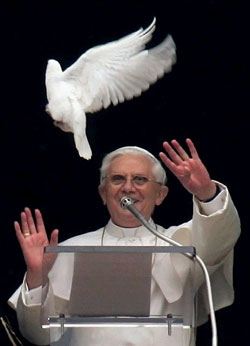 Every year, since 1967, the Roman Catholic Church celebrates, on January 1st, feast of Mary, Mother of God, the World Day of Peace. Here are excerpts from this year’s message, written by Pope Benedict XVI on December 8, 2006:
Every year, since 1967, the Roman Catholic Church celebrates, on January 1st, feast of Mary, Mother of God, the World Day of Peace. Here are excerpts from this year’s message, written by Pope Benedict XVI on December 8, 2006:
At the beginning of the new year, I wish to extend prayerful good wishes for peace to governments, leaders of nations, and all men and women of good will. In a special way, I invoke peace upon all those experiencing pain and suffering, those living under the threat of violence and armed aggression, and those who await their human and social emancipation, having had their dignity trampled upon. I invoke peace upon children, who by their innocence enrich humanity with goodness and hope, and by their sufferings compel us all to work for justice and peace.
Out of concern for children, especially those whose future is compromised by exploitation and the malice of unscrupulous adults, I wish on this World Day of Peace to encourage everyone to reflect on the theme: The human person, the heart of peace. I am convinced that respect for the person promotes peace and that, in building peace, the foundations are laid for an authentic integral humanism. In this way a serene future is prepared for coming generations.
 Sacred Scripture affirms that "God created man in his own image, in the image of God he created them; male and female he created them" (Gen 1:27). As one created in the image of God, each individual human being has the dignity of a person; he or she is not just something, but someone, capable of self-knowledge, self-possession, free self-giving and entering into communion with others. At the same time, each person is called, by grace, to a covenant with the Creator, called to offer him a response of faith and love that no other creature can give in his place.
Sacred Scripture affirms that "God created man in his own image, in the image of God he created them; male and female he created them" (Gen 1:27). As one created in the image of God, each individual human being has the dignity of a person; he or she is not just something, but someone, capable of self-knowledge, self-possession, free self-giving and entering into communion with others. At the same time, each person is called, by grace, to a covenant with the Creator, called to offer him a response of faith and love that no other creature can give in his place.
From this supernatural perspective, one can understand the task entrusted to human beings to mature in the ability to love and to contribute to the progress of the world, renewing it in justice and in peace. In a striking synthesis, Saint Augustine teaches that "God created us without our aid; but he did not choose to save us without our aid." Consequently all human beings have the duty to cultivate an awareness of this twofold aspect of gift and task.
Likewise, peace is both gift and task. If it is true that peace between individuals and peoples — the ability to live together and to build relationships of justice and solidarity — calls for unfailing commitment on our part, it is also true, and indeed more so, that peace is a gift from God. Peace is an aspect of God’s activity, made manifest both in the creation of an orderly and harmonious universe and also in the redemption of humanity that needs to be rescued from the disorder of sin.
Creation and Redemption thus provide a key that helps us begin to understand the meaning of our life on earth. My venerable predecessor Pope John Paul II, addressing the General Assembly of the United Nations on October 5, 1995, stated that "we do not live in an irrational or meaningless world... there is a moral logic which is built into human life and which makes possible dialogue between individuals and peoples."
The transcendent "grammar", that is to say the body of rules for individual action and the reciprocal relationships of persons in accordance with justice and solidarity, is inscribed on human consciences, in which the wise plan of God is reflected. As I recently had occasion to reaffirm: "we believe that at the beginning of everything is the Eternal Word, Reason and not Unreason (Homily at Regensburg, Sept. 12, 2006.)." Peace is thus also a task demanding of everyone a personal response consistent with God’s plan. The criterion inspiring this response can only be respect for the "grammar" written on human hearts by the divine Creator.
From this standpoint, the norms of the natural law should not be viewed as externally imposed decrees, as restraints upon human freedom. Rather, they should be welcomed as a call to carry out faithfully the universal divine plan inscribed in the nature of human beings. Guided by these norms, all peoples — within their respective cultures — can draw near to the greatest mystery, which is the mystery of God. Today too, recognition and respect for natural law represents the foundation for a dialogue between the followers of the different religions and between believers and non-believers. As a great point of convergence, this is also a fundamental presupposition for authentic peace.
The duty to respect the dignity of each human being, in whose nature the image of the Creator is reflected, means in consequence that the person can not be disposed of at will. Those with greater political, technical, or economic power may not use that power to violate the rights of others who are less fortunate. Peace is based on respect for the rights of all. Conscious of this, the Church champions the fundamental rights of each person. In particular she promotes and defends respect for the life and the religious freedom of everyone. (...)
As far as the right to life is concerned, we must denounce its widespread violation in our society: alongside the victims of armed conflicts, terrorism and the different forms of violence, there are the silent deaths caused by hunger, abortion, experimentation on human embryos and euthanasia. How can we fail to see in all this an attack on peace? Abortion and embryonic experimentation constitute a direct denial of that attitude of acceptance of others which is indispensable for establishing lasting relationships of peace.
As far as the free expression of personal faith is concerned, another disturbing symptom of lack of peace in the world is represented by the difficulties that both Christians and the followers of other religions frequently encounter in publicly and freely professing their religious convictions. Speaking of Christians in particular, I must point out with pain that not only are they at times prevented from doing so; in some States they are actually persecuted, and even recently tragic cases of ferocious violence have been recorded. There are regimes that impose a single religion upon everyone, while secular regimes often lead not so much to violent persecution as to systematic cultural denigration of religious beliefs. In both instances, a fundamental human right is not being respected, with serious repercussions for peaceful coexistence. This can only promote a mentality and culture that is not conducive to peace.
At the origin of many tensions that threaten peace are surely the many unjust inequalities still tragically present in our world. Particularly insidious among these are, on the one hand, inequality in access to essential goods like food, water, shelter, health; on the other hand, there are persistent inequalities between men and women in the exercise of basic human rights. (…)
In his Encyclical Letter Centesimus Annus, Pope John Paul II wrote: "Not only has God given the earth to man, who must use it with respect for the original good purpose for which it was given to him, but man too is God’s gift to man. He must therefore respect the natural and moral structure with which he has been endowed." By responding to this charge, entrusted to them by the Creator, men and women can join in bringing about a world of peace.
Alongside the ecology of nature, there exists what can be called a "human" ecology, which in turn demands a "social" ecology. All this means that humanity, if it truly desires peace, must be increasingly conscious of the links between natural ecology, or respect for nature, and human ecology. Experience shows that disregard for the environment always harms human coexistence, and vice versa. It becomes more and more evident that there is an inseparable link between peace with creation and peace among men. Both of these presuppose peace with God. The poem-prayer of Saint Francis, known as "the Canticle of Brother Sun", is a wonderful and ever timely example of this multifaceted ecology of peace. (…)
The destruction of the environment, its improper or selfish use, and the violent hoarding of the earth’s resources cause grievances, conflicts and wars, precisely because they are the consequences of an inhumane concept of development. Indeed, if development were limited to the technical-economic aspect, obscuring the moral-religious dimension, it would not be an integral human development, but a one-sided distortion which would end up by unleashing man’s destructive capacities.
Let every believer, then, unfailingly contribute to the advancement of a true integral humanism in accordance with the teachings of the Encyclical Letters Populorum Progressio and Sollicitudo Rei Socialis, whose respective fortieth and twentieth anniversaries we prepare to celebrate this year. To the Queen of Peace, the Mother of Jesus Christ "our peace" (Eph 2:14), I entrust my urgent prayer for all humanity at the beginning of the year 2007, to which we look with hearts full of hope, notwithstanding the dangers and difficulties that surround us. May Mary show us, in her Son, the Way of peace, and enlighten our vision, so that we can recognize Christ’s face in the face of every human person, the heart of peace!
BENEDICTUS PP. XVI